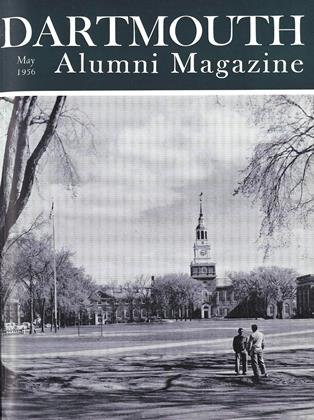Kwanha Yim'58 was born in Sinchon, Korea, in 1929. His father was a farmer with forty tenant families on his property. The crops were rice and wheat. In 1946, the Communists set their land reform machinery in motion. The resources of the family were wiped out. The Yims left for the south. The parents, three sisters, and Kwanha crossed the twenty miles of no man's land at the 38th parallel on foot. What possessions they had they carried in their arms and on their backs.
For a while Mr. Yim worked for the government in Seoul and then the family moved out to the coast, leaving Kwanha to work his way through high school by selling newspapers and tutoring. In June of 1950, he entered the University of Seoul. Three days later the war broke out and in three days more Seoul had fallen and Kwanha was on his way south again to seek refuge in Myryang, south of Pusan.
He found work as a translator with a United States army surgical hospital. There he met a Dr. Howard Sloman who took a special interest in his young translator and when Kwanha left the hospital after three months' work, he had Dr. Sloman's name and United States address in his notebook.
Kwanha went back to Seoul to continue his education at the University but found that the buildings had been taken over by the American 8th Army. So he worked in the university buildings anyway — as a janitor in the office of the chief of staff. As he went about his work, he was alert for any English he could hear in order to improve his command of the language. With toplevel secrets under discussion con- stantly, Kwanha's eager ear made some of the top brass uneasy. He was ordered not to listen, confined to a small room when not working, and when sweeping or mopping he was followed closely by a sergeant. Even when jobs were hard to come by, he felt that these working conditions were less than ideal and he left to join the Korean Army.
He took a course in military courtesy and nomenclature and then after two weeks was commissioned as a 1st Lieutenant in a Korean infantry regiment as an interpreter for liaison work with American troops.
Kwanha says that the translator's work in the field during war goes beyond mere translation. "He has not only to translate what one party says to the other, but also to be able to measure and transmit it at the right voltage without changing the substance of what has been said. When a high pressure is built up in one side, it is his humane, if not official, duty to see that it is lowered in the course of its translation. When the voltage is not high enough, it ought to be reinforced so it can do the job."
He came to know many Americans in the Army and one of them, a Harvard man, talked with him at length about educational opportunities in the United States, and suggested several colleges to which he might apply. This circumspect, reconstructed Harvard man suggested Dartmouth and after an agonizing wait and initial disappointment Kwanha was informed by the Dartmouth Admissions Office that he had been admitted and had been awarded the financial aid. But there was still the matter of transportation to the United States. The Dr. Sloman he had met at the field hospital had made an offer of help years before but Kwanha had lost the notebook with his address one night at Hynori when he had to escape an encirclement of Communists.
A friend in the United States found Dr. Sloman's address and in short order he arranged transportation through the American Korean Foundation. It was only then that Kwanha found that his friend, Dr. Howard S. Sloman, is a member of the Class of 1946 at Dartmouth.
Kwanha matriculated at Dartmouth in September 1954 and will finish in June 1957. As an International Relations major, he is working on a compressed schedule of six courses each semester and will attend summer school at Columbia again this summer. His academic record of eight A's, ten B's and one C-plus, along with his out- standing personal qualifications, is a hearty sign of continued success in graduate school and in his career as a teacher or government worker in Korea.
Kwanha Yim '58
 View Full Issue
View Full Issue
More From This Issue
-
 Feature
FeatureD C U
May 1956 By GEORGE H. KALBFLEISCH, -
 Feature
FeatureOliver Wendell Holmes Slept – and Taught – Here
May 1956 By ROBERT S. BLUM '55 -
 Feature
FeatureNEW YORK ALUMNI AWARDS
May 1956 -
 Class Notes
Class Notes1918
May 1956 By ERNEST H. EARLEY, RICHARD A. HOLTON -
 Class Notes
Class Notes1923
May 1956 By CHESLEY T. BIXBY, THEODORE D. SHAPLEIGH -
 Class Notes
Class Notes1926
May 1956 By HERBERT H. HARWOOD, ANDREW J. O'CONNOR, RICHARD EBERHART '26
R.L.A.
-
 Article
ArticleBig Green Captain
October 1954 By R.L.A. -
 Article
ArticleWhat Makes Hogarty Run?
April 1955 By R.L.A. -
 Article
ArticlePresident of Players
May 1955 By R.L.A. -
 Article
Article"Will you give the Valedictory?"
June 1955 By R.L.A. -
 Article
ArticleVox Stationis WDCR Glamantis
By R.L.A. -
 Article
ArticleAn Outgoing President
June 1958 By R.L.A.







